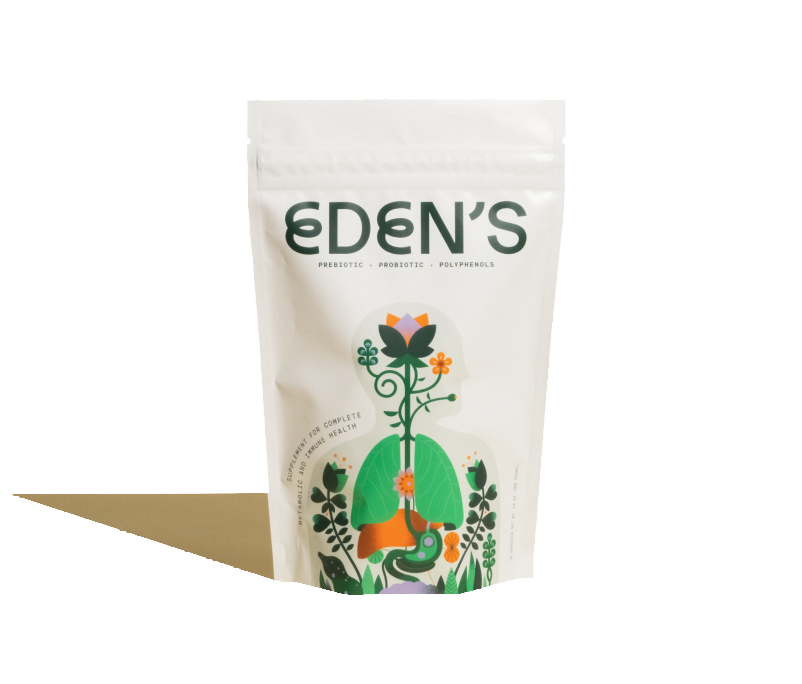Metabolic 101

Metabolic health is a critical factor for avoiding chronic diseases such as cardiovascular disease and type 2 diabetes — yet only 12% of American adults are in good metabolic health. Even more sobering is the fact that the prevalence of metabolic syndrome (MetS) — a cluster of conditions that increase your risk for heart disease, stroke, diabetes, and other serious conditions — affected nearly 42% of our population in 2019.
Early the following year, the COVID-19 pandemic started making its way around the globe, inflicting more severe symptoms and increasing the risk of death for individuals with metabolic syndrome. Thus, MetS is a serious public health crisis; yet, unlike certain other diseases, metabolic syndrome is preventable if individuals focus on gut health, maintain a healthy weight, manage blood sugar and blood pressure levels (if necessary), and adhere to other healthy lifestyle strategies.
What is metabolic syndrome?
Metabolic syndrome, also called insulin resistance syndrome, is a cluster of conditions that together increase your risk for several serious health conditions. If you have three or more of the following conditions, you may have metabolic syndrome:
- A large waistline: Extra fat around your midline is a big risk factor for heart disease. To measure your waist circumference, just take some measuring tape and wrap it all the way around your waist. Ideally, you want a waist circumference of less than 40 inches for men and less than 34.6 inches for women.
- High blood pressure: Chronically elevated blood pressure can damage your heart and blood vessels and cause plaque build up in your arteries, as well as lead to insulin resistance (see next point). Blood pressure is measured as two numbers, which represent the pressure blood exerts against your arterial walls during (systolic) and between (diastolic) heartbeats. Healthy blood pressure levels are lower than 120/80. (However, you don’t want your blood pressure to go too low, since low blood pressure can also cause health complications.)
-
High blood sugar: Constant blood sugar spikes (or chronically high blood pressure) can cause your pancreas to overproduce insulin to the point that your cells stop responding to it, a phenomenon called insulin resistance, which significantly increases your risk for type 2 diabetes (T2D). Additionally, chronically high blood sugar can damage your blood vessels and increase your risk for blood clots. A healthy blood sugar level should be between 70 and 100 mg/dL after an overnight fast.
- High blood triglycerides: The most common kind of fat circulating in your body, triglycerides act as your body’s energy-storage molecules, setting aside unused calories for future use. High levels of triglycerides in your blood can raise levels of LDL cholesterol (i.e., “bad cholesterol”), driving the buildup of fatty acid deposits in your arteries and increasing your risk for cardiovascular disease (CVD). Healthy triglyceride levels are below 150 mg/dL.
- Low HDL cholesterol: While high LDL cholesterol is a problem, low levels of the “good cholesterol,” HDL, are also a problem. HDL can actually remove LDL for your blood vessels, preventing plaque build up and more serious cardiovascular conditions. HDL also reduces the risk of obesity and CVD. Healthy HDL levels should be at least as high as 40 mg/dL for men and 50 mg/dL for women.
Who is at risk for metabolic syndrome?
One of the biggest risk factors for metabolic syndrome is the condition clinically called “overweight and obesity.” This is because fat cells, especially those around your waist, raise free fatty acids in your bloodstream. These free fatty acids then cause your body to produce other chemicals and hormones that impact how your body regulates blood sugar. Dysregulated blood sugar, as discussed above, can lead to insulin resistance, which is associated with increased blood pressure and triglycerides as well as a greater risk for T2D. Fat cells also play a big role in promoting inflammation, which also increases your risk for several diseases including cardiovascular disease and diabetes.
There are several other risk factors for MetS. Some are modifiable risk factors, meaning that you can control or change them. Others are non-modifiable, meaning that you can’t control them.
Modifiable risk factors for metabolic syndrome include:
- Inactivity
- Unhealthy diet/overeating
- Not getting enough sleep
- Smoking and drinking
- Shift work
Non-modifiable risk factors for metabolic syndrome include:
- Age
- Family history/genetics
- Other medical conditions, including polycystic ovary syndrome (PCOS), immune system problems, and sleep disorders
- Sex
If you do think you might be at risk for or have MetS, speak with your healthcare provider immediately. MetS has been associated with several more serious conditions, including the aforementioned T2D and CVD, plus non-alcoholic fatty liver disease (NAFLD). Working with your healthcare provider to prevent those conditions is of the utmost importance. In addition, there’s much you can do about it right from your home, as we detail in the following sections.
What does the gut have to do with metabolic syndrome?
Given the strong correlations between obesity, high blood sugar, high triglycerides, an unhealthy diet, and increased risk for MetS and more severe conditions, you probably won’t be surprised to hear that the key to preventing MetS lies in the gut. Because low-grade, chronic inflammation and insulin resistance are two of the biggest drivers of MetS, CVD, T2D, and NAFLD, your gut is your first line of defense against these adverse health outcomes.
A healthy gut is one that lacks inflammation. Both food particles and the microbes that live in our gut are “foreign” particles, which means our bodies must have physiological systems in place to avoid inappropriate immune responses to these completely normal and even necessary things. While gut microbes themselves can help the body recognize food particles as harmless, a healthy intestinal barrier is also important to prevent food particles, bad bacteria, and bacterial toxins (such as LPS) from crossing into the circulation and causing an immune response. Long-term inflammation in the gut can damage this barrier, which further increases inflammation in a vicious circle.
A healthy intestinal barrier is critical for preventing inflammation. This barrier is maintained by tight junctions, also called TJs, which are composed of over 50 different proteins. Pathogenic bacteria (such as Salmonella), LPS, inflammation, malnutrition, and even certain medications can all compromise TJs. Compromised TJs can lead to something called “leaky gut syndrome,” which, while not a clinically recognized condition, can compromise metabolic health.
A common driver of both inflammation and insulin resistance is obesity:
-
When an individual becomes obese, immune cells (macrophages and T cells) infiltrate into adipose (fat) tissue, causing a type of inflammation called “metaflammation,” defined by a chronic low-grade inflammation initiated by metabolic and inflammatory cells in response to excessive energetic nutrient load.
-
With obesity, immune cells recruited to adipose tissue promote the production of several proinflammatory molecules. These molecules not only impede insulin signaling, leading to insulin resistance, but they also recruit more immune cells, which release more pro-inflammatory molecules, propagating a vicious inflammatory cycle.
- Obesity is also associated with a disrupted gut microbiome and reduced protective mucus layer lining the intestines. Disruption of this layer permits bacteria and bacterial components, such as LPS, to cross over and induce an inflammatory response. To make matters worse, some of the inflammatory molecules released during this inflammatory response contribute to insulin resistance.
Dietary strategies for improving gut and metabolic health
Keeping your gut healthy — in order to reduce inflammation, insulin resistance, and risks for the myriad disorders that can ensue — involves lifestyle modifications including getting enough exercise and sleep, and avoiding substance abuse. Dietary factors are paramount, also, and include reduced sugar consumption and a diet low in saturated fats. Discover the best foods for a healthy gut.
It’s also clear by now, on the dietary front, that many of the effects that foods and drinks have on our health are due to their action upon the bacteria that live in our guts — our microbiome. Therefore, we’re going to focus on three very specific dietary categories that can get you on your way to better gut and metabolic health: probiotics, prebiotics, and polyphenols.
Probiotics
Probiotics are defined as live microorganisms that confer health benefits when consumed. Although there is still debate concerning probiotics and their usefulness, as most of them haven’t been scientifically proven to support an already healthy gut, they have been proven beneficial in a number of disease contexts, including MetS. A systematic review of randomized controlled trials reveals that:
-
Probiotic intake in patients with MetS improved body mass index, blood pressure, glucose metabolism, and lipid profiles.
- Probiotic intake in patients with MetS was associated with a decrease in inflammatory molecules.
Numerous other studies, in both animal models and humans, have corroborated these results, suggesting that specific probiotic bacteria (mostly Bifidobacterium and Lactobacillus species) reduce markers of inflammation and improve physiological measurements in individuals with MetS or any of the individual conditions that comprise it.
Found in fermented foods such as yogurt, kefir, sauerkraut, and kimchi, probiotics are also widely available in supplement form.
Prebiotics
Prebiotics are fibers (note: not all fibers are prebiotics) that support a healthy gut and healthy gut microbiome. Many of the anti-inflammatory and gut barrier-strengthening effects of the gut microbiome are due to short-chain fatty acids (SCFAs), which are produced by gut bacteria when they break down fiber. Several research studies have linked increased fiber consumption with healthy TJs, prevention of leaky gut syndrome, and production of intestinal mucus.
By contrast, high-fat diets low in fiber (i.e, the typical Western diet) are associated with compromised gut barrier integrity and increased inflammation. Some prebiotic fibers have been shown to delay gastric emptying, which in turn promotes satiety and may therefore aid in weight management. (Learn more: Can prebiotics help with weight loss?)
Studies in humans and animals have demonstrated several benefits of prebiotic consumption in the context of MetS:
- Increased probiotic species (Bifidobacterium and Lactobacillus) with concurrent improvements in metabolic markers and reduced markers of inflammation
- Better balance between hormones that help control food intake
- Protection against a compromised gut barrier caused by a high-fat diet
Prebiotics are plentiful in a plant-forward diet of vegetables, fruits, legumes, whole grains, nuts and seeds. Prebiotics can also be obtained from dietary supplements.
Polyphenols
Polyphenols are a type of phytonutrient (i.e., they come from plants; specifically, the leaves) known for their antioxidant properties. The general mechanism of action for polyphenols is believed to involve the promotion of a healthy inflammatory response, neutralization of damaging free radicals, and a resultant positive impact upon the gut microbiome. The relationship between polyphenols to the gut microbiome appears to be bi-directional; polyphenols can help balance good and bad bacteria, while gut microbes help metabolize polyphenols into compounds that are more easily absorbed by your body.
Several studies in humans have demonstrated that polyphenol consumption can improve metabolic health:
- Decreased weight
- Decreased blood pressure (see: What are the heart health benefits of polyphenols?)
- Decreased blood sugar
- Improved lipid metabolism
- Improved insulin resistance
Numerous fruits and vegetables contain various polyphenols, but no one food contains a broad variety of them; therefore, it’s best to balance your diet with a rich array of different plant foods to reap the myriad benefits of polyphenols and other macro- and micronutrients. Polyphenols are also available as supplements.
Take Eden’s to maximize your metabolic health
Eden’s Synbiotic Supplement is a 3-in-1 formulation of probiotics, prebiotics and polyphenols that can provide substantial benefits to your metabolic health. (Before trying a supplement, speak to your medical professional; then, be an informed consumer and utilize resources available to you when shopping for the supplement that’s best for you: See our 3-Step guide: How to buy supplements.)
- As discussed above, several probiotic species, including Lactobacillus, improve metabolic health. Eden’s contains two Lactobacillus species, L. rhamnosus GG and L. paracasei (LPC-37), that have been shown to increase insulin sensitivity in mouse models and improve cardiometabolic health in women with high blood pressure. Eden’s also contains the probiotic species Bacillus coagulans SC208, which can help lower triglyceride levels within a probiotic mix.
-
Eden’s also contains several prebiotics with specific benefits for metabolic health. Resistant potato starch helps control blood sugar and may increase feelings of fullness.
Barley beta glucan can also help manage blood sugar levels and reduce hunger; additionally, it has been shown to help decrease waist circumference and visceral fat, reduce harmful cholesterol levels, and lower blood pressure in obese individuals. Locust bean gum reduces cholesterol and LDL cholesterol level. Guar gum feeds your gut microbes, promoting SCFA production.
- Eden’s contains polyphenols extracted from several sources, including kiwifruit, lychee, and green tea. Each of these ingredients act as strong antioxidants associated with improved metabolic health. Consumption of polyphenols is also associated with reduced LDL levels and lowered CVD risk.
Key takeaways
Maintaining your metabolic health is an essential part of ensuring your well-being and avoiding more serious diseases such as CVD, diabetes, obesity, and NAFLD. A growing body of research links the development of metabolic syndrome to events that begin in your gut, which is actually good news — because by modifying your lifestyle to optimize gut health, you can ensure your metabolic health. One major lifestyle component is diet: We should all avoid unhealthy, saturated fats; processed foods; and high-sugar foods and drinks. But we should also feed our gut ecosystem with probiotics, prebiotics, and polyphenols. Eden’s is a metabolic supplement worth considering, as it contains scientifically vetted and tested ingredients across all three of these categories. If you think you could benefit from Eden’s, speak with your healthcare provider and be on your way to better metabolic health.



